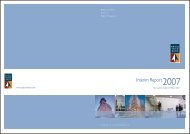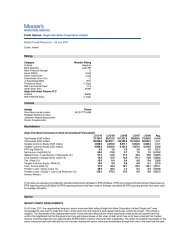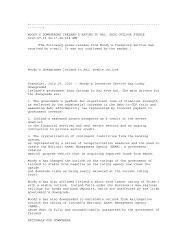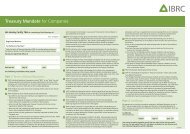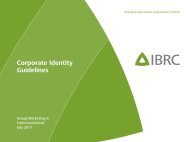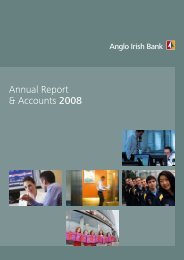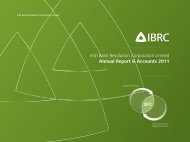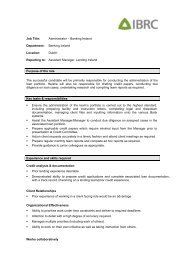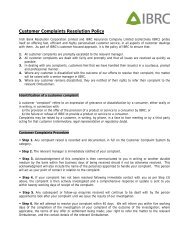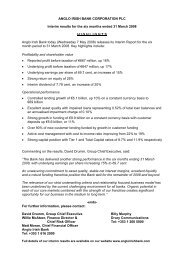Annual Report & Accounts 2009 - Anglo Irish Bank
Annual Report & Accounts 2009 - Anglo Irish Bank
Annual Report & Accounts 2009 - Anglo Irish Bank
Create successful ePaper yourself
Turn your PDF publications into a flip-book with our unique Google optimized e-Paper software.
Notes to the financial statements continued<br />
51. Risk management and control continued<br />
122<br />
Aged analysis of financial assets past due but not impaired<br />
The following tables present an analysis of financial assets, other than those carried at fair value, where contractual interest or<br />
principal payments are past due but impairment is not appropriate as the level of collateral and the present value of estimated<br />
future cash flows available to the Group is sufficient.<br />
Other<br />
Business Other Financial<br />
Commercial Residential <strong>Bank</strong>ing Lending Assets Total<br />
€m €m €m €m €m €m<br />
Past due 1 to 30 days 962 68 263 127 - 1,420<br />
Past due 31 to 60 days 665 319 14 52 - 1,050<br />
Past due 61 to 90 days 346 19 14 52 - 431<br />
Past due 91 days and over 943 262 193 461 - 1,859<br />
Total 2,916 668 484 692 - 4,760<br />
Other<br />
Business Other Financial<br />
Commercial Residential <strong>Bank</strong>ing Lending Assets Total<br />
€m €m €m €m €m €m<br />
Past due 1 to 30 days 240 76 4 56 - 376<br />
Past due 31 to 60 days 143 31 1 11 - 186<br />
Past due 61 to 90 days 124 46 - 6 - 176<br />
Past due 91 days and over 744 155 28 117 - 1,044<br />
Total 1,251 308 33 190 - 1,782<br />
Collateral<br />
The Group<br />
31 December <strong>2009</strong><br />
The Group<br />
30 September 2008<br />
The acceptance of both financial and non-financial collateral is central to the risk mitigation and underwriting policies of the<br />
Group. The nature of the collateral held will reflect the transaction being underwritten. Loans and advances to customers are<br />
collateralised principally by charges over real estate assets, business assets and liens on cash deposits, and are supplemented by<br />
personal guarantees. In the case of clients with more than one transaction, the <strong>Bank</strong> seeks to cross-collateralise security to<br />
strengthen repayment cover.<br />
Due to the significant dislocation in property markets and the lack of transactional activity over the period, it is impracticable<br />
for the <strong>Bank</strong> to obtain reliable fair values for individual collateral held against past due or impaired financial assets as at<br />
31 December <strong>2009</strong>. However declines in prices of approximately 50% since the market peak for <strong>Irish</strong> commercial property<br />
reflected in certain market indices would appear to be a fair indicator of the scale of the decline in collateral values over the<br />
past twelve months. Ireland, which represents the majority of impaired and past due loan balances, experienced the most<br />
significant drop in valuations compared with price declines in the UK and US markets. At 30 September 2008, collateral of<br />
€834m was held against impaired loans and advances to customers of €957m.<br />
During the period the Group repossessed collateral, consisting of land and property, of €6m on balances of €20m (2008: €7m<br />
on balances of €15m). It is the Group’s policy to dispose of repossessed assets in an orderly fashion. The proceeds are used to<br />
reduce or repay the outstanding balance. The Group does not use repossessed assets for business purposes.<br />
Loans and advances to banks are generally unsecured except where securities are held as collateral in reverse repurchase<br />
agreements (note 22). Credit risk in respect of exposures to certain monetary financial institutions is mitigated by financial<br />
guarantees from parent institutions or governments. The Group has executed Collateral Support Agreements ('CSAs') with its<br />
principal interbank derivatives counterparties. Under the terms of a CSA, if the aggregate market value of a set of derivative<br />
contracts between two parties exceeds an agreed threshold amount, the party which would be exposed to loss in the event of<br />
default receives a deposit of cash or eligible securities equal to the excess aggregate value over the threshold.




